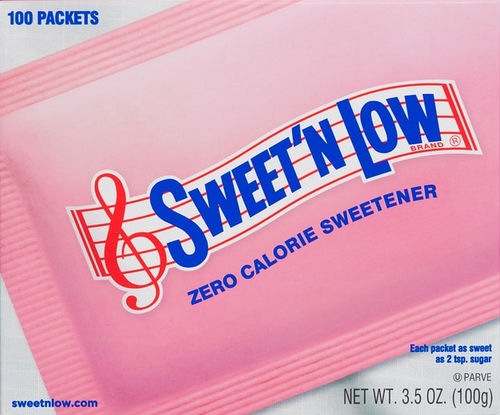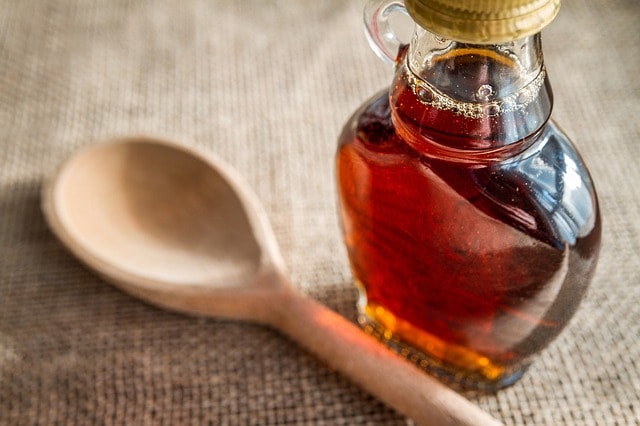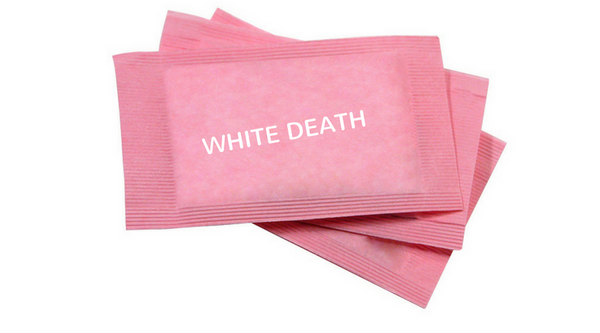Artificial sweeteners are a common ingredient in what many people believe to be a healthy diet. Sure, they satisfy your sweet tooth while avoiding the empty calories and unwanted health consequences of sugar…But, these alternatives to sugar may not be doing your health any favors.
Read on to learn more about the harmful effects of artificial sweeteners and some healthier alternatives.
What Are Artificial Sweeteners?
Simply put, an artificial sweetener is a synthetic sugar substitute.
Created in a laboratory, artificial sweeteners use both artificial and naturally derived ingredients. The various types of artificial sweeteners have different chemical profiles and tastes… But most products carry an overly sweet chemical aftertaste.
Artificial sweeteners provide sweetness with no or very few calories and are typically many times sweeter than sugar.
They are marketed to people who are looking for products low in calories and sugars. Many dieters and diabetics are advised to reduce their sugar consumption. So they look to artificial sweeteners to help them do so without giving up their favorite foods.
If you are trying to improve your health by using artificial sweeteners, it's important to understand why they are bad for you.
Artificial sweeteners are used in processed foods to lower (or completely remove) the sugar. You can find artificial sweeteners in packaged baked goods, condiments, canned goods, drinks and drink mixes.
Artificial sweeteners are also packaged for home use. Some of these products can be used in place of sugar in baking and cooking with varying degrees of success.
Types of Artificial Sweeteners

There are many different types of artificial sweeteners. Examples include:
- Sucralose (Splenda)
- Saccharine (Sweet ‘N Low)
- Aspartame (Equal, NutraSweet)
- Aacesulfame potasssium (Sunett, Sweet One)
Marketers of artificial sweeteners may use misleading wording to convince you of the safety of their products. All artificial sweeteners are chemical concoctions created in a laboratory.
For example, the makers of Splenda advertise their product as being made from sugar. While this claim is technically true, they really only modify the sugar molecules to create a new chemical called sucralose. Sucralose does not contain any sugar.
Now that you know what artificial sweeteners are, and what to look for on the ingredients label, let's take a look at the reasons why they are bad for you.
The 7 Harmful Effects of Artificial Sweeteners
1. Artificial Sweeteners Make You Overeat
They do this by impeding your brain’s ability to sense satiety. Because foods made with artificial sweeteners have a different texture than sugar sweetened foods, your brain does not receive the correct satiety signals. Your brain may stop associating sweetness with caloric intake, leading to overindulgence.
All types of artificial sweeteners have the potential to disrupt satiety signals. If your goal is calorie control, these mixed messages may greatly reduce your chances of success.
2. Artificial Sweeteners May Change the Way You Taste Food
Artifical sweeteners overstimulate sugar receptors in your taste buds. They are many times more potent than sugar, leaving you craving sweeter and sweeter tastes.
All artificial sweeteners have this effect. Although the amount used and relative sweetness of a particular sweetener plays a role.
This change may cause you to crave overly sweet processed foods instead of healthier foods like vegetables and naturally sweet fruit. Opting for nutritionally void processed foods over truly healthy choices will not do your health any favors.
3. Aspartame and Sucralose May Increase Diabetes Risk
They interfere with your body’s insulin response. Studies have shown a 67 percent greater likelihood of developing type 2 diabetes among daily diet soda drinkers.
It is possible that the sweet taste triggers the release of insulin in anticipation of an influx of glucose. When the sweet taste comes from an artificial sweetener, that glucose never arrives. When this occurs daily over a more extended period, you may be putting yourself at higher risk for insulin resistance and diabetes.
Also, a small study from diabetesjournal.com has shown sucralose to be of particular concern about diabetes. This response explains why artificial sweeteners are harmful to those at risk for diabetes.
4. Aspartame Contains Phenylalanine
Phenylalanine is toxic for people with the genetic disorder PKU. Although PKU is relatively rare, the implications for those affected are significant. If you have PKU, phenylalanine can cause intellectual disabilities, brain damage, and seizures. Even in the general population, high doses of phenylalanine can worsen feelings of anxiety and jitteriness in people.
5. Artificial Sweeteners, Particularly Aspartame, Can Trigger Headaches
It can be difficult to prove a causal relationship between the use of artificial sweeteners and headaches. There is evidence that Aspartame can cause headaches and migraines in sensitive individuals. Many migraine sufferers report sensitivity to other food additives. It's possible they could very well be sensitive to any chemical sweetener.
While many people consume artificial sweeteners and do not get headaches, the possible relationship is an important concern to note.
6. Artificial Sweeteners Could Cause Cancer
Cancer worries were first raised in the 1970s about saccharin. Later studies indicated this risk could not be generalized to humans.
In the 1980s, new cancer worries were raised when aspartame appeared to be linked to the development of brain tumors. Again, medical research did not find a causal relationship. Finally, artificial sweeteners are linked to the development of lymphoma and leukemia… But, study results have been inconsistent.
While the cancer risk from artificial sweetener use appears to be weak or unproven by current medical research, these concerns should be enough to convince you to exercise caution.
7. Artificial Sweeteners Are Bad for the Environment
Because the body does not break down any of these artificial sweeteners, we excrete them as waste products, and they get flushed into our sewers. Water treatment plants are only able to remove a part of them from our wastewater. The treated water leaves the treatment plant with some artificial sweeteners still present, polluting our rivers and streams.
Alternatives to Artificial Sweeteners
Now that we’ve identified several reasons why artificial sweeteners are bad for people and the environment, you may be curious if there are better alternatives to these products. Several natural sweeteners have been gaining in popularity as more people look for healthier alternatives.
Stevia

Stevia is an herbal sweetener extracted from the stevia plant. Stevia extract has been used as a natural sweetener for centuries but has gained mainstream popularity in recent years.
Stevia is available in liquid and powdered forms under many brand names. You can even substitute it for sugar in recipes.
Stevia does not seem to affect blood sugar or insulin response, which is one of the reasons why artificial sweeteners are harmful. When used in its most natural state, stevia is indeed a natural product with a long history of human consumption.
Monk Fruit

Monk fruit sweetener may not be as well known as stevia, but it is gaining in popularity among people following paleo or ketogenic diets.
Monk fruit is a small melon grown in parts of Asia, and the extract of the fruit is used as a sweetener and natural remedy for many centuries. As monk fruit sweetener’s popularity grows, it is becoming increasingly available in both powdered and dried forms. Consumers should carefully read food labels to ensure they are purchasing the most natural, additive-free form of monk fruit sweetener.
Monk fruit provides antioxidants, immune and digestive support and other benefits. This makes this natural product superior to artificial sweeteners.
Honey and Maple Syrup

Honey and maple syrup, while not low in sugars or calories, are excellent natural sweeteners when used sparingly. Both sweeteners contain healthy antioxidants, vitamins, and minerals. Maple syrup is lower in total sugars and specifically glucose, which may make it a healthier option for many people.
Diabetics should use both honey and maple syrup with caution due to the sugar content of these foods. Yet, for otherwise healthy people, honey and maple syrup are both healthy in small amounts.
Conclusion
Artificial sweeteners were likely introduced to help people lower their sugar consumption. But in reality, the harmful effects of artificial sweeteners are bad for your health! Avoid them as often as possible. Consumers need to be aware to read food labels because artificial sweeteners are hidden in a lot of packaged foods. Using natural sweeteners is the healthy way to go in avoiding the health risks of artificial sweeteners.

Author Bio
 Janine Einhellig is owner and author at KetoDomain.com, a website focused on helping people achieve success on the ketogenic diet through information, meal plans and coaching. Janine enjoys writing and operating Keto Domain because of the great impacts the ketogenic diet can have on quality of life.
Janine Einhellig is owner and author at KetoDomain.com, a website focused on helping people achieve success on the ketogenic diet through information, meal plans and coaching. Janine enjoys writing and operating Keto Domain because of the great impacts the ketogenic diet can have on quality of life.
https://www.facebook.com/ketodomain/
https://www.instagram.com/ketodomain/



Great post and thank you for providing alternatives to artificial sweeteners. SO glad that honey and maple syrup is on that list!
Aspartame is a terrible, toxic additive and it is a terrible shame that “low sugar” or “diet” products are promoted so enthusiastically as those products are full of aspartame… such a shame…
I agree! I’m always amazed when I see people reaching for a little pink pack of sweetener. Plus, I’ve never enjoyed the taste, personally. It reminds me of chemicals… which it IS! 🙂